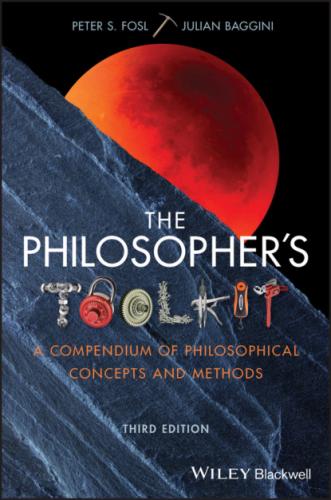Praise for previous editions
‘The Philosopher’s Toolkit provides a welcome and useful addition to the introductory philosophy books available. It takes the beginner through most of the core conceptual tools and distinctions used by philosophers, explaining them simply and with abundant examples. Newcomers to philosophy will find much in here that will help them to understand the subject.’
David S. Oderberg,University of Reading
‘. . . the average person who is interested in arguments and logic but who doesn’t have much background in philosophy would certainly find this book useful, as would anyone teaching a course on arguments, logic, and reasoning. Even introductory courses on philosophy in general might benefit because the book lays out so many of the conceptual “tools” which will prove necessary over students’ careers.’
About.com
‘Its choice of tools for basic argument . . . is sound, while further tools for argument . . . move through topics and examples concisely and wittily . . . Sources are well chosen and indicated step by step. Sections are cross‐referenced (making it better than the Teach Yourself “100 philosophical concepts”) and supported by a useful index.’
Reference Reviews
“This book is . . . an encyclopedia of philosophy. It should be of great use as a quick and accurate reference guide to the skill of philosophy, especially for beginners, but also for instructors . . . highly recommended.”
Choice
“The Philosopher’s Toolkit is a very good book. It could be highly useful for both introductory courses in philosophy, or philosophical methodology, as well as independent study for anyone interested in the methods of argument, assessment and criticism . . . It is unique in approach, and written in a pleasant and considerate tone. This book will help one to get going to do philosophy, but more advanced students might find this text helpful too. I wish I had had access to this book as an undergraduate.”
Teaching Philosophy
PETER S. FOSL and JULIAN BAGGINI
THE PHILOSOPHER’S
A Compendium of PhilosophicalConcepts and Methods
THIRD EDITION
This third edition first published 2020
© 2020 Peter S. Fosl and Julian Baggini
Edition history: Blackwell Publishing Ltd (1e, 2003; 2e, 2010)
All rights reserved. No part of this publication may be reproduced, stored in a retrieval system, or transmitted, in any form or by any means, electronic, mechanical, photocopying, recording or otherwise, except as permitted by law. Advice on how to obtain permission to reuse material from this title is available at http://www.wiley.com/go/permissions.
The right of Peter S. Fosl and Julian Baggini to be identified as the authors of this work has been asserted in accordance with law.
Registered Offices John Wiley & Sons, Inc., 111 River Street, Hoboken, NJ 07030, USA John Wiley & Sons Ltd, The Atrium, Southern Gate, Chichester, West Sussex, PO19 8SQ, UK
Editorial Office 111 River Street, Hoboken, NJ 07030, USAFor details of our global editorial offices, customer services, and more information about Wiley products visit us at www.wiley.com.
Wiley also publishes its books in a variety of electronic formats and by print‐on‐demand. Some content that appears in standard print versions of this book may not be available in other formats.
Limit of Liability/Disclaimer of Warranty While the publisher and authors have used their best efforts in preparing this work, they make no representations or warranties with respect to the accuracy or completeness of the contents of this work and specifically disclaim all warranties, including without limitation any implied warranties of merchantability or fitness for a particular purpose. No warranty may be created or extended by sales representatives, written sales materials or promotional statements for this work. The fact that an organization, website, or product is referred to in this work as a citation and/or potential source of further information does not mean that the publisher and authors endorse the information or services the organization, website, or product may provide or recommendations it may make. This work is sold with the understanding that the publisher is not engaged in rendering professional services. The advice and strategies contained herein may not be suitable for your situation. You should consult with a specialist where appropriate. Further, readers should be aware that websites listed in this work may have changed or disappeared between when this work was written and when it is read. Neither the publisher nor authors shall be liable for any loss of profit or any other commercial damages, including but not limited to special, incidental, consequential, or other damages.
Library of Congress Cataloging‐in‐Publication Data
Names: Fosl, Peter S., author. | Baggini, Julian, author.
Title: The philosopher’s toolkit : a compendium of philosophical concepts and methods / Peter S. Fosl and Julian Baggini.
Description: Third edition. | Hoboken : Wiley‐Blackwell, 2020. | Includes bibliographical references and index.
Identifiers: LCCN 2019053537 (print) | LCCN 2019053538 (ebook) | ISBN 9781119103219 (paperback) | ISBN 9781119103226 (adobe pdf) | ISBN 9781119103233 (epub)
Subjects: LCSH: Reasoning. | Methodology.
Classification: LCC BC177 .F675 2020 (print) | LCC BC177 (ebook) | DDC 101–dc23 LC record available at https://lccn.loc.gov/2019053537 LC ebook record available at https://lccn.loc.gov/2019053538
Cover Design: Wiley
Cover Images: WMM‐Retro coal © Alex_Po/Shutterstock, Supermoon
© tanoochai/Shutterstock, Dark grey black slate © aesah kongsue/Shutterstock, Nuts and bolts © Winston Link/Shutterstock, Iso Lock © tacojim/iStock.com, Engine Parts Machine © MR.TEERASAK KHEMNGERN/Shutterstock, Magnet and nails © revers/Shutterstock, A set of rulers © Sergio Stakhnyk/Shutterstock, Vice grips © Thomas Northcut/Getty Images, Steelyard with black © Dimedrol68/Shutterstock, Plumbing tools © ansonsaw/iStock.com
For Rick O’Neil, colleague and friend, in memoriam
Acknowledgements
We are indebted to Nicholas Fearn, who helped to conceive and plan this book, and whose fingerprints can still be found here and there. We are deeply grateful to Jeff Dean at Wiley‐Blackwell for nurturing the book
